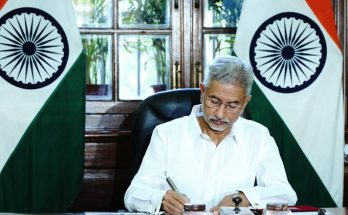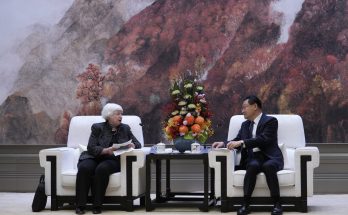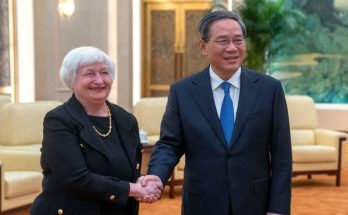
In a pioneering step, India and China are set to bolster their post-Wuhan convergence by signing a landmark internal security cooperation agreement, which will set an upbeat tone for the meeting between their leaders in Argentine capital Buenos Aires towards November-end.
The first-ever security pact between Asia’s leading economies will be signed during the visit of China’s Minister of Public Security Zhao Kezhi to New Delhi on October 22. Home Minister Rajnath Singh’s talks with Mr Zhao will focus on enhanced coordination and interaction between security agencies of the two countries to combat terror and address common security threats.
The security pact marks a major movement towards bolstering trust and increasing mutual understanding between security establishment of the two countries. The proposed pact will encompass, among other things, intelligence sharing, exchange programme, sharing of best practices and cooperation in disaster mitigation.

“The security pact reinforces the perception that the Wuhan consensus forged between PM Modi and Chinese President Xi Jinping is producing tangible results. This pact could be an important trust-building exercise and lead to a more nuanced understanding of each other’s position and practice on terrorism and other shared security threats,” said Manish Chand, Editor-in-Chief, India and World magazine and India Writes Network.
“Enhanced security cooperation, along with plans to expand military-to-military contacts, will help prevent Doklam-like incidents and foster greater stability in India-China relations,” he said.

Enhanced security and counter-terror cooperation will also figure during discussions between Prime Minister Narendra Modi and Chinese President Xi Jinping on the sidelines of the G20 summit of the world’s largest economies, in Buenos Aires on November 30.
The two sides are also set to expand counter-terror cooperation, despite differences over the issue of the UN listing of Pakistani terrorist Masood Azhar, by holding the next edition of “Hand-in-Hand” joint exercise in December. The annual joint anti-terror drill could not be held last year due to the prolonged Doklam face-off, putting bilateral relations under enormous stress.
In another visible sign of post-Wuhan thaw, India and China recently launched the first joint project for training of Afghan diplomats. “Both of us uphold that Afghanistan should realize peace, stability and prosperity. Both of us are against terrorism,” China’s ambassador to India Luo Zhaohui said at the inauguration ceremony.
The initiative for the joint training of Afghan diplomats was decided during the defining meeting between India’s Prime Minister Narendra Modi and Chinese President Xi Jinping in the picturesque city of Wuhan in April.
Responding to terrorist threats in its far-western province of Xinjiang and the rise of the Islamic State in the region, China is looking for a bigger overseas role for its elite counter-terrorism forces. “Counter-terrorism preparations must follow the expansion of the country’s strategic interests,” Zhang Xiaoqi, the head of intelligence for China’s People’s Armed Police, the premier counter-terror agency, told Xinhua recently. “We must strive to become a deterrent force to safeguard national security, a pioneering force to protect overseas interests and an elite force for universal fighting.” In 2015, China enacted a wide-ranging new counter-terrorism law that allows the army and police to conduct or join counter-terrorism missions overseas.
In Xinjiang, China has launched a comprehensive de-radicalisation drive, which includes training and vocational programme for Uyghur Muslims to counter allied threats of terrorism and extremism.
Author Profile
Latest entries
 India and the WorldAugust 25, 2019Amid Pakistan’s Kashmir fury, UAE, Bahrain fete Modi with top civilian honours
India and the WorldAugust 25, 2019Amid Pakistan’s Kashmir fury, UAE, Bahrain fete Modi with top civilian honours India and the WorldAugust 15, 2019India@72: Modi unveils Rs100-trillion infrastructure upgrade for $5 trillion economy
India and the WorldAugust 15, 2019India@72: Modi unveils Rs100-trillion infrastructure upgrade for $5 trillion economy India and the WorldJuly 22, 2019Chandrayaan-2 launch: India’s Moon dreams soar high
India and the WorldJuly 22, 2019Chandrayaan-2 launch: India’s Moon dreams soar high India and the WorldFebruary 20, 2019Saudi Arabia bets on $100 billion India opportunity, backs terror concerns
India and the WorldFebruary 20, 2019Saudi Arabia bets on $100 billion India opportunity, backs terror concerns






